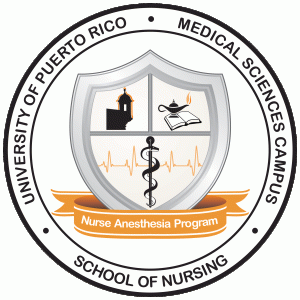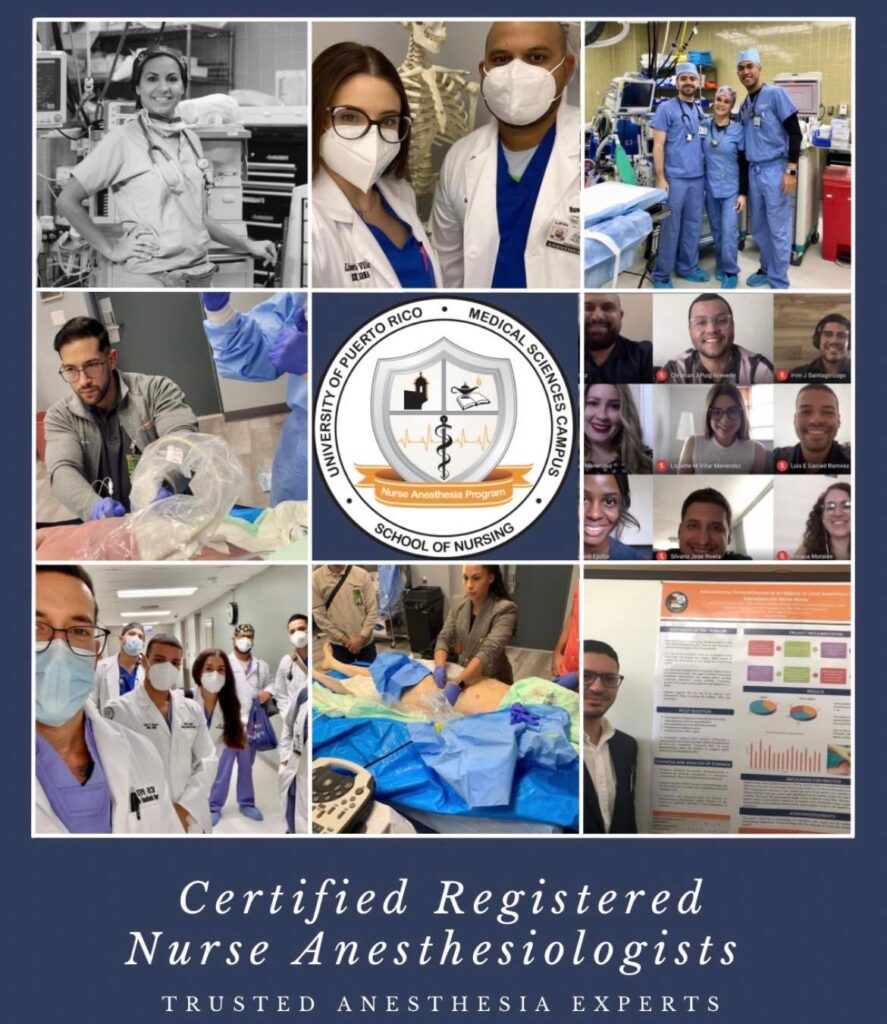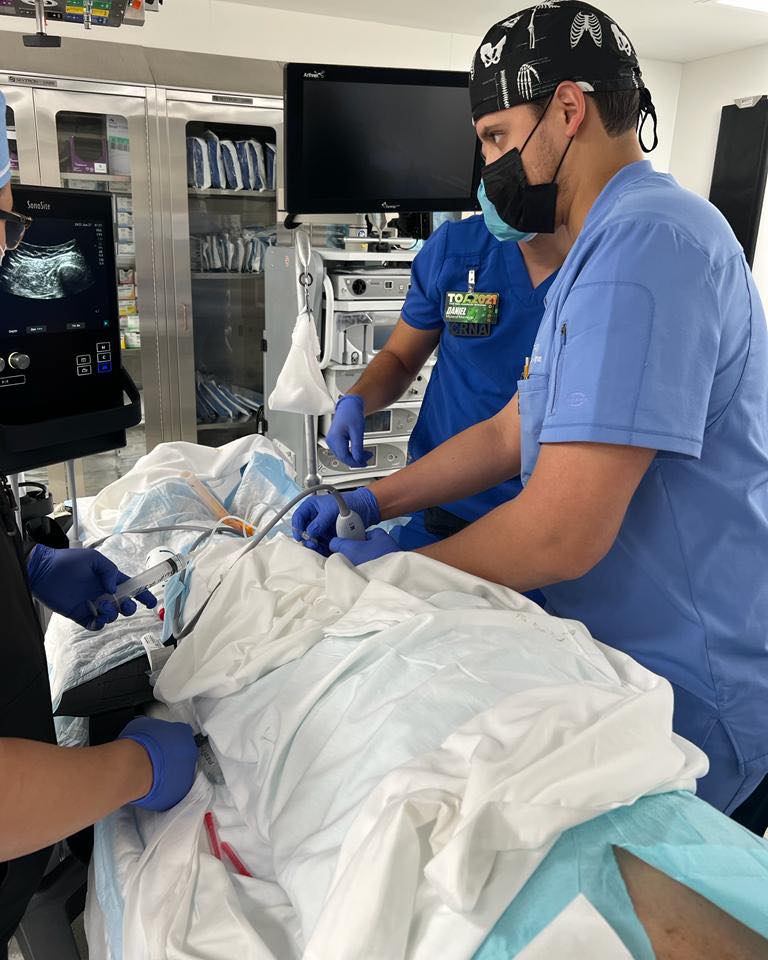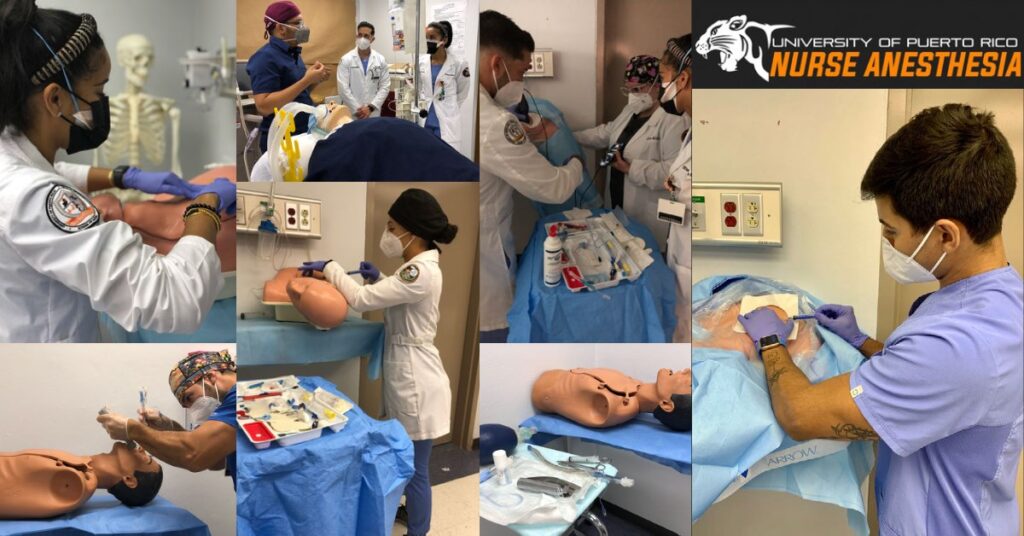Skip to content
Doctor of Nursing Practice with Specialty in Anesthesia (DNP-SA)
You are here:
- Home
- Doctor of Nursing Practice with…

The Doctor of Nursing Practice with Specialty in Anesthesia prepares advanced practicing nurses with a high level of scientific background who have the knowledge and skills to evaluate complex nursing anesthesia situations. Graduates should be able to assume the responsibility to identify and assume the best course of actions and decisions that may have a profound effect upon an individual.
Applications will be accepted between September 1 and December 15.
Mission
Prepare highly qualified, advanced nurse anesthesia professionals at the doctoral level with a solid foundation in evidence-based practice, critical thinking skills, quality improvement, and systems leadership; that lead and foster collaborative efforts, while educating and providing the best quality of anesthesia care to the society.
Program Goals
Goal #1: Prepare advanced practice nurse anesthetists at the doctoral level to meet anesthesia healthcare needs in Puerto Rico.
Goal #1 Objectives:
1.1: Recruit competent students with critical care background, capable of doctoral level work.
1.2: Provide a learning environment that promotes knowledge acquisition and development of skills and attitudes required for safe and evidence-based anesthesia practice.
1.3: Provide students with sufficient, accessible, and appropriate support services, learning resources and specialized clinical sites.
Goal #2: Offer a program that meets professional and accreditation standards.
Goal #2 Objectives:
2.1: Assure a solid curricular offering consistent with professional and accreditation standards that prepares successful practitioners in advanced nurse anesthesia practice.
2.2: Keep an ongoing assessment of expected student learning and program outcomes to assure program effectiveness.
2.3: Maintain accreditation status of the program by CCNE and COA.
Goal #3: Recruit and develop highly competent faculty, doctorally prepared, that contributes to teaching, practice, service and scholarly activities.
Goal #3 Objectives:
3.1: Promote interprofessional collaboration among faculty, nurse anesthetists and anesthesiologists to enhance education, service, and evidence-based research in anesthesia.
3.2: Promote faculty development by maintaining CRNA credentials, continued development of professional skills in education and teaching, enhancement of clinical expertise, and commitment to scholarly activities.
Goal #4: Ensure that adequate human, financial and physical resources are available to the program.
Goal #4 Objectives:
4.1: Assure the human resources necessary to support the program’s academic, administrative, and student services components.
4.2: Seek financial resources that are available to the nurse anesthesia program.
4.3: Fulfill the needs of the program in relation to quality and availability of physical resources.
Academic Degree
Doctor of Nursing Practice with Specialty in Anesthesia (DNP-SA)
Curriculum
- The curriculum has been designed to prepare professional nurse anesthetists with the knowledge, skills and attitudes required for delivery of anesthesia through a variety of methods and other anesthesia-related care, as defined in the AANA Scope and Standards for Anesthesia Practice.
- Didactic: One thousand and seventy-one (1,071) hours.
- Clinical Practice: Two thousand, five hundred and forty-four (2,544) hours, including eleven hundred fifty-two (1,152) hours of residency I & II.
- Clinical Correlational Conferences: Fifty-four (54) hours.
- Laboratory/Simulation: One hundred and twenty-six (126) hours.
- Independent Study: Sixty (60) hours.
Admission Requirements
- Possess a Baccalaureate or Master degree in nursing from a nationally accredited program (CCNE or ACEN)
- A 3.00 GPA in general education courses, sciences, and nursing courses.
- Undergraduate Statistics and Chemistry courses with B grade or better (3 credits each).
- English proficiency as evidenced by TOEFL preferably a general score of 80 or above and a specific reading score of 20 or more). Required for students not completing high school or college education in the continental U.S.
- Demonstrate Spanish proficiency during the interview process.
- Evidence of current license as registered nurse.
- To comply with state laws, all students are required to be licensed as a registered nurse in the Commonwealth of Puerto Rico. The license is required at the beginning of the study program.
- Must have a minimum of one year (two preferred) of full-time work experience (2,080hours), or its part-time equivalent, as a registered nurse in a critical care setting within the last five years. The applicant must have developed as an independent decision-maker capable of using and interpreting advanced monitoring techniques based on knowledge of physiological and pharmacological principles.
- Possess current competency in Basic Life Support (BLS), Advanced Cardiac Life Support (ACLS), and Pediatric Advanced Life Support certifications (PALS)
- Three (3) letters of recommendation. One (1) from each of the following: a) most recent employer; b) a health care professional, preferably a licensed physician or a CRNA, and c) a teacher that can attest the academic suitability to pursue graduate education. The letters should reflect an accurate appraisal of clinical skills, experience, and independent decision-making. Recommendation Letter Format.
- Submit a written commitment to sit for National Certification Examination (NCE) within 120 days after graduation.
- Submit an updated Curriculum Vitae.
- Computer literacy.
- Complete the Medical Sciences Campus’ Online Admissions Form and submit the supporting documentation required.
- Obtain a minimum average of 70% as a result of the total of the following criteria:
-
- Cumulative GPA 20%
- Minimum Specific Index 25%
- Simulation 15%
- Personal Interview 25%
- Scientific Paper Analysis 10%
- Analysis or Curriculum Vitae 5%
Application Deadlines
- October 31- Early decision (based on a thorough analysis)
- December 15 – Regular decision
Program’s Length of Study
- Thirty-six (36) consecutive calendar months.
- Full-time student enrollment requirement.
Graduation Requirements
Completion of 87 credits for the degree.
- Approve the courses of the curricular sequence with a minimum grade of B.
- Obtain a General Academic Point Average of 3.0 in the scale of 4.0.
- Completion of the didactic courses and clinical hours as specified by the Program and the National Board of Certification and Recertification Nurse Anesthesia (NBCRNA).
- Comply with the total number of required and preferred anesthesia cases by “patient physical status, special cases, position, anatomical categories, methods of anesthesia, pharmacological agents, arterial technique, central venous pressure catheter, pulmonary catheter and others” as established by the COA Standards.
- Pass the Comprehensive Nurse Anesthesia Examination.
Nurse Anesthesia Program Statistics
| Graduating Class |
Attrition Rate |
Employment of Graduates
within Six Months |
NCE Pass Rate for
First-Time Takers |
2023
(MSN-SA) |
N/A |
100% |
100% |
2024
(No class due to DNP transition) |
N/A |
N/A |
N/A |
2025
(DPN-SA) |
13%
(2/16) |
100% |
100% |
Why the University of Puerto Rico – Nurse Anesthesia Program transitioned to the post-baccalaureate (entry level) Doctor of Nursing Practice (DNP) from the Master of Science in Nursing?
According to the Council on Accreditation of Nurse Anesthesia Educational Programs (COA), all accredited Nurse Anesthesia programs in the United States and Puerto Rico must transition to a doctoral program by 2022. The UPR-NAP faculty believe, as innovators in Nurse Anesthesia education, that it’s important to be at the forefront of this transition to the doctoral level.
What degree plan does the UPR Nurse Anesthesia Program offer?
The program will provide a graduate level curriculum leading to the award of a Doctor of Nursing Practice (DNP) with Specialty in Anesthesia degree. The curriculum is designed as a post-baccalaureate to Doctor of Nursing Practice (BSN-DNP).
Is the UPR-NAP front-loaded or integrated?
Integrated nurse anesthesia programs typically arrange their curricula so that students participate in didactic and clinical education concurrently. Front loaded program students complete all didactic courses before beginning their clinical experience. The UPR-NAP follows an integrated model.
How long is the UPR-NAP DNP Program?
The UPR-NAP DNP Program is a 36 consecutive months integrated curriculum.
Why should I choose a DNP Program?
A CRNA with a DNP will have the credentials necessary to not only function in the clinical setting, but also assume leadership position in healthcare systems, and to participate in academia and research. The American Association of Colleges of Nursing (AACN) and the American Association of Nurse Anesthetists (AANA) have adopted the entry-to-practice doctorate degree requirement by 2025 for Certified Registered Nurse Anesthetists. The DNP title is the accepted title for the terminal practice doctorate degree in nursing.
How many clinical sites are affiliated with the UPR-NAP?
The UPR-NAP has more than 12 clinical sites. This number may change as more sites are added to ensure that all students meet the minimum number of required cases set by the COA.
- Medical Services Administration of Puerto Rico (ASEM) – Main OR, Pediatric University Hospital, Adult University Hospital, Trauma
- Cardiovascular Center of Puerto Rico and the Caribbean
- Doctor Center Hospital – Bayamón, Manatí, San Juan, and Carolina
- Bayamón Medical Center
- Manatí Medical Center
- San Jorge Children and Women’s Hospital
- Puerto Rico Children and Women’s Hospital
- VA Healthcare Caribbean
- University Hospital UPR-Carolina – Dr. Federico Trilla
- Mennonite Medical Center – Cayey
- Auxilio Mutuo Hospital
- San Juan Municipality Hospital*
- University of Puerto Rico Comprehensive Cancer Center
Will I be expected to cover call shifts and Holidays?
Yes, to meet the accreditation requirements, the UPR-NAP has provided opportunities for its students to obtain clinical experiences outside the regular clinical hours schedule by a call experience or other mechanism.
Can I work while I am enrolled in the program?
Successful completion of the DNP-SA requires a substantial time commitment during the 36-month program. Historically, given the rigorous nature of the program, students find it difficult to subsidize their educational expenses through part-time employment. We strongly discourage students from working during their time in the program. Doing so could negatively impact your academic and clinical experience. Students are strictly prohibited from working in any capacity that involves the administration of anesthesia.
Does the UPR-NAP-DNP Program curriculum meet the educational requirements for professional licensure as a Certified Registered Nurse Anesthetist in all U.S. states, territories and the District of Columbia?
Yes, once the student complete the graduation requirements, they are eligible to sit to take the National Certification Examination.
Does the Program include simulation?
Yes, high, intermediate, and low fidelity simulators are used throughout the curriculum to provide consistent and safe environment of both routine and unusual anesthesia situations.
Is there a part-time plan of study?
No, our current degree offering is full-time only.
Should I spend time with a CRNA observing cases in the OR?
Yes, we highly encourage all applicants to become familiar with the role of the CRNA. You may ask your own institution to shadow a CRNA and observe the operating room environment. This should be done early in the application process to allow you time to understand the role of the CRNA, the profession to which you are applying. Current nurse anesthesia students may offer a wealth of information from the student perspective to help you prepare.
Is liability insurance required while enrolled in the NAP?
Yes, the liability insurance will be covered by the University of Puerto Rico, Medical Sciences Campus at no additional cost.
Is health insurance required while attending the NAP?
Yes, students are required to have health insurance during the entire program of study. You may choose between the insurance from the University of Puerto Rico or a private insurance.
How do I apply to the UPR-NAP?
The applicant must complete the Medical Sciences Campus’ Online Admission Form and should select the “Master in Science of Nursing with Specialty in Anesthesia” It will be understood that you are applying for the Doctor of Nursing Practice with Specialty in Anesthesia Program. Please use the following link to access the online application: https://admisiones.upr.edu
When is the application deadline?
October 31 – Early Decision
January 31 – Regular Decision
What are the requirements for admission?
- Possess a baccalaureate degree in nursing from a nationally accredited program (CCNE or ACEN).
- A 3.00 GPA in general education courses, sciences, and nursing courses.
- Undergraduate Statistics and Chemistry courses with B grade or better (3 credits each).
- English proficiency as evidenced by TOEFL preferably a general score of 80 or above and a specific reading score of 20 or more). Required for students not completing high school or college education in the continental U.S.
- Demonstrate Spanish proficiency during the interview process.
- Evidence of current license as registered nurse.
- To comply with state laws, all students are required to be licensed as a registered nurse in the Commonwealth of Puerto Rico. The license is required at the beginning of the study program.
- Must have a minimum of one year (two preferred) of full-time work experience (2,080hours), or its part-time equivalent, as a registered nurse in a critical care setting within the last five years. The applicant must have developed as an independent decision-maker capable of using and interpreting advanced monitoring techniques based on knowledge of physiological and pharmacological principles.
- Possess current competency in Basic Life Support (BLS), Advanced Cardiac Life Support (ACLS), and Pediatric Advanced Life Support certifications (PALS)
- Three (3) letters of recommendation. One (1) from each of the following: a) most recent employer; b) a health care professional, preferably a licensed physician or a CRNA, and c) a teacher that can attest the academic suitability to pursue graduate education. The letters should reflect an accurate appraisal of clinical skills, experience, and independent decision-making. Recommendation Letter Format.
- Submit an updated Curriculum Vitae.
- Complete the Medical Sciences Campus’ Online Admissions Form and submit the supporting documentation required.
- Obtain a minimum average of 70% as a result of the total of the following criteria:
- Cumulative GPA 20%
- Minimum Specific Index 25%
- Simulation 15%
- Personal Interview 25%
- Scientific Paper Analysis 10%
- Analysis or Curriculum Vitae 5%
Who should I contact regarding the application process?
Janette Carrasquillo
Admissions Officer
janette.carrasquillo
Ext. 5214, 5215
José L. Bonilla-García
Program Director
jose.l.bonilla@upr.edu
787-758-2525 ext. 2034
How many applications are received each year?
We receive anywhere from 40 – 55 applications, depending on the year.
How many students will be accepted?
We admit a maximum of 17 students.
Is a baccalaureate degree required for admission?
Yes, all applicants must have completed a baccalaureate or higher degree in nursing for admission.
How can I verify if my nursing school was accredited?
The institution granting the nursing degree must be accredited by the Commission on Collegiate Nursing Education (CCNE) or the Accreditation Commission for Education in Nursing (ACEN).
Click here to find CCNE accredited programs.
Click here to find ACEN accredited programs.
Are all undergraduate course grades used to calculate my overall GPA?
Yes, all undergraduate course grades are used to calculate your general GPA.
How is the specific GPA calculated?
The specific GPA is calculated using all nursing course grades and additionally the following courses: Human Anatomy/Physiology, Microbiology, Chemistry.
Are pre-requisite courses required for admission?
Yes, undergraduate Statistics and Chemistry courses with B grade or better (3 credits each).
What are the Test of English as a Foreign Language (TOEFL) requirements?
English proficiency as evidenced by TOEFL preferably a general score of 80 or above and a specific reading score of 20 or more). Required for students not completing high school or college education in the continental U.S.
Do I need to take the GRE or MAT exams for admission?
Do I need to speak Spanish for admission to the program?
Yes, Spanish proficiency will be evaluated during the interview process.
Do you require a Puerto Rico RN license to apply for the program?
Applicants must have a valid unencumbered/unrestricted RN license in one of the 50 United States or Puerto Rico which must be submitted at the time of application. A Puerto Rico RN license is not required at the time of application. Students accepted to the UPR-NAP must possess an unencumbered Puerto Rico RN license for their admission in June and at all times during the program.
How many years of RN experience are required?
Applicants must be currently working as a licensed registered nurse in an area of intensive are nursing (e.g. ICU, CVICU, SICU, MICU, Neuro-ICU, etc.) or Trauma for at least one year (two preferable).
What is considered critical care experience?
Critical care experience must be obtained in a critical care area within the United States, its territories or a US military hospital outside of the United States. During this experience, the registered professional nurse has developed critical decision making and psychomotor skills, competency in patient assessment, and the ability to use and interpret advanced monitoring techniques. A critical care area is defined as one where, on a routine basis, the registered professional nurse manages one or more of the following: invasive hemodynamic monitors (e.g., pulmonary artery, central venous pressure, and arterial catheters), cardiac assist devices, mechanical ventilation, and vasoactive infusions. Examples of critical care units may include but are not limited to: surgical intensive care, cardiothoracic intensive care, coronary intensive care, medical intensive care, pediatric intensive care, and neonatal intensive care. Those who have experiences in other areas may be considered provided they can demonstrate competence with managing unstable patients, invasive monitoring, ventilators, and critical care pharmacology.
Does operating room, post-anesthesia care units (PACU) and/or emergency room experience count towards the critical care requirement?
How recent should my critical care experience be?
How do I submit the written commitment to sit for the National Certification Exam?
The written commitment to sit for the National Certification Examination is completed by admitted students during their initial orientation.
What should be included in my CV?
- Variety of extracurricular courses
- Experiences of great responsibilities
- Professional distinctions
- Professional associations memberships (CPEPR excluded due to compulsory requirement)
- Scholarly work, research
- Missionary travel, leadership travel
- Volunteer work
Are all applicants granted an interview?
Only complete applications (all requirements met) will be reviewed.
When can I expect to be notified if I am granted an interview?
Candidates selected for an interview will be notified between November-December for documents sent by October 31st, or February – March for documents sent by January 31st.
If I do not meet admission criteria in all categories, will exemplary performance in other categories be considered as a replacement for unmet categories?
If I am accepted for admission to the Program, will I be required to make a deposit to hold my position?
Yes, applicants that are accepted in the program are required to make a $25 deposit to secure their position. The deposit will be credited toward the student’s tuition at the time of enrollment.
Do you require CCRN certification for application or admission?
What types of financial aid are available?
Information on financial aid can be found on the University of Puerto Rico Medical Sciences Campus website (www.rcm.upr.edu) under students > financial aid. Prior to starting the program, the FAFSA will need to be completed. The Office of Financial Aid at UPR-MSC can help you with your choices.
What is the anticipated cost of attendance for the UPR-NAP?
Cost per credit
- Puerto Rico Resident – $500
- Non-Resident – $700
Annual UPR-NAP Fee – $2,000 (divided during semester 1 & 2 of each academic year)
University Fees (3-year total) – $1,300 (include technology, facility, and laboratory fee)
Students will train in a variety of clinical settings covering a wide range of clinical experiences. Students will complete more than 2,500 clinical hours in addition to simulated experiences in our Center for Skills Development
El RCM tiene vigente la Licencia de Renovación de la Junta de Instituciones Postsecundarias y está acreditado por la MSCHE (Middle States Commission on Higher Education). Además, no discrimina por raza, religión, sexo, nacionalidad, edad, origen o condición social o económica, impedimento físico o mental, ni afiliación política.
The Medical Sciences Campus holds a Postsecondary Institutions Board Renewal License and is accredited by the MSCHE (Middle States Commission on Higher Education).In addition, it does not discriminate based on race, religion, sex, nationality, age, origin or social or economic condition, physical or mental disability, or political affiliation.




